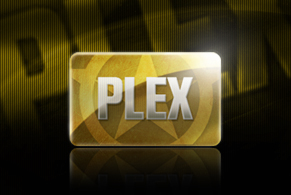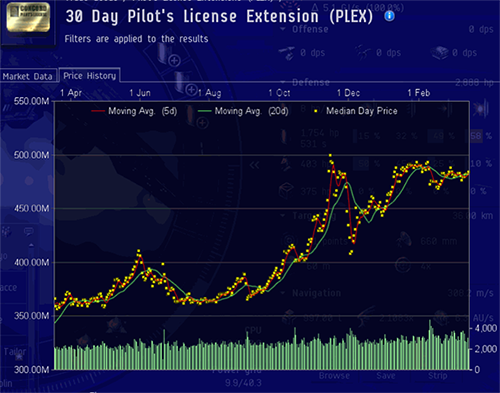I got a bit into EVE Online recently. I find it interesting since it represents a slightly different way of thinking about online games – one that seems to run against the practices established by World of Warcraft / Farmville at times. One instance in which I was struck by this is in the implementation of the PLEX system.
It is interesting because it deals with two challenges of modern MMO design at once:
- The control and leverage of in-game currency trading
- The implementation of the free-to-play model
Each of the two comes with a whole array of issues. Linking real money to in-game currency has the potential to wipe out the game’s economy as seen in Diablo 3. Even in the best case, it seems like the emergence of destructive shadow economies such as gold farmers is inevitable. Free-to-play is a related issue – how can you give away parts of the experience for free without dividing the community. Which features should be free, which features should be paid-for? How do you integrate a paywall in a seamless fashion? How do you prevent “pay-to-win”? How do you implement a payment model that doesn’t seem exploitative?

PLEX – Pilot Licence Extenstion
In EVE Online, a PLEX is an in-game item that can be bought on the official website for around 20 EUR. It can be traded in-game. It can be also “consumed” for a few account-related services, most notably a 30-day extension of the subscription.
This simple implementation results in an astonishingly complex dynamic which ends up addressing the above challenges.
-
One-Way Trading – The system allows only the purchase of in-game currency, not the sale. This legitimizes part of the otherwise illegal currency trading market without necessary sanctioning destructive activities like gold farming. Of course, gold farming in some form still exists. But with players having a safe and sanctioned way of purchasing currency it is being somewhat marginalized.
-
Self-balancing – In order to turn a PLEX into in-game currency, players need to sell a PLEX on the game’s marketplace. CCP doesn’t actually dictate how much in-game money (”ISK”) you will get for the 20 EUR. The in-game market itself finds a “fair” exchange value for ISK. If players over-use the PLEX system, they flood the market with PLEXes and the in-game price will drop. If players snub PLEXes, they will become rare and therefore worth more.

The value for a PLEX is determined by way of the free market. The collective community decide what is a fair exchange rate.
-
Reverse Free-to-Play – Most importantly, the system allows for a very different kind of Free-to-play which I haven’t seen yet. Usually, Free-to-play is used to lure newcomers into the game and then use the sunk cost of invested time as leverage to convert them into paying customers. PLEX also allows players to play for free but at the very opposite side of the spectrum: experienced players can earn enough money to pay for their monthly subscription with in-game currency.
Let us examine that last notion because it sounds so wonderfully counter-intuitive. After all, conventional wisdom at creating business models is to exploit the Whales – the biggest, most invested fans. Even in an old-school subscription model, there ought to always be that hard-core hardline faction who subscribed at launch and never terminated their account. Those guys pay the bills, right? Why would you give them a freebie?
I have no data to go buy, but I suspect what happens is a similar dynamic we see in music piracy – the guys, who listen to the most pirated music also tend to spend a lot of money on legal music. The are just generally very interested in music. Yes, the EVE pro can chose not to pay for their subscription with Euros. But that means they would have to pay with ISK, and that may be actually the currency they find more valuable.
Because don’t kid yourself, currently a PLEX costs around 600 Million ISK. That’s a substantial amount of in-game money. It is juuuuuust out of reach for an EVE newcomer to get that kind of money in their first month. But even after the first month, throwing away that much hard-earned in-game money is financially crippling. EVE discussion forums regularly point out that grinding out a PLEX with in-game activities is a job with a laughably low wage. It is vastly more time-efficient to earn the required 20 EUR by wiping the floors at the local fast food restaurant.
For me, the penny dropped when I was considering getting a 3-Plex deal on Amazon to pay for another month. I was immediately tempted by converting 2 of the remaining PLEXes into ISK. After all, that huge wad of in-game money would open a lot of possibilities for me. For an EVE enthusiast, a PLEX may be more interesting as a way to get ISK than a way to extend the subscription.
But that doesn’t mean that there aren’t players out there, who won’t try. The same people, who would be otherwise attracted by a regular Free-to-play model regularly come in on 14-day-trial accounts. They are drawn in by the prospect of eventually being able to play the game for free. Most of them fail, of course. But they try hard and over the course of their two weeks they invest so much into the game, many of them are probably converted into subscribers. The PLEX system provides them with a goal to work towards to – something the game of EVE is otherwise lacking.
It is an interesting implementation that I haven’t seen being discussed outside of the game’s community often. It challenges conventional wisdom on how online game business models are supposed to work. It may not work for every game, but it can be a good incentive for designers to think outside of the box.






Awesome article. I’ve always been fascinated by EVE Online, but slightly terrified to play because it might consume the rest of my life. PLEX is a nifty system, for sure.